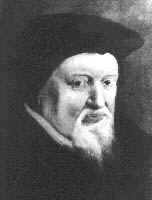Ulrich
Zwingli
During his ministry at Einsiedeln, Zwingli began to entertain doubts about certain church practices. In 1516 he read a Latin translation of the Greek New Testament published by the Dutch humanist Desiderius Erasmus, which he later transcribed into notebooks and memorized verbatim. On the basis of these and other scriptural readings, Zwingli charged in sermons that church teachings and practice had diverged widely from the simple Christianity of the Holy Writ. Among the practices cited by Zwingli as unscriptural were the adoration of saints and relics, promises of miraculous cures, and church abuses of the indulgence system. His forthright affirmations of scriptural authority won him wide popular repute, and on January 1, 1519, he was appointed priest at the Gross Münster (German, "Great Cathedral") in Zürich. During the same year Zwingli read for the first time the writings of his contemporary, Martin Luther. Heartened by Luther's stand against the German hierarchy, Zwingli in 1520 persuaded the Zürich council to forbid all religious teachings without foundation in the Scriptures. Among these teachings was the church stricture against eating meat during Lent. In 1522 a group of his followers deliberately broke the rule and were arrested. Zwingli vigorously defended the lawbreakers, who were released with token punishment. In comparison to Luther and Calvin, both of whom wrote a great deal, Zwingli stuck to a single theme throughout his arguments and writing: if the Old or New Testament did not say something explicitly and literally, then no Christian should believe or practice it. This was the basis of his critique of indulgences and the idiom of all his theological thought. In 1522, for instance, Zwingli mounted a protest against the fast at Lent, a standard Catholic practice. His argument: the New Testament says absolutely nothing about fasting at Lent so the practice is inherently unchristian. There are two important shifts in Western religious experience that result from this position. The first is the literal reading of the Old and New Testaments. No longer would these texts be dark and mysterious, full of difficult and allegorical meanings; instead, the texts of the Old and New Testaments became something like statute law. The words meant what they said; any difficulty, contradiction, obscure meaning, or whatever, was the fault of the reader and not the text. Second, from this profound shift in the reading of the central writings of Christianity developed one of the most strict and severe applications of these writings to social life. Not only were practices not contained in Scriptures to be shunned, but practices, beliefs, and rules that were contained in the literal meaning of the Old and New Testaments were to be adhered to absolutely and uncritically. This became the underpinning of the social theories and organization of radical Protestant and Puritan societies and later the foundational social organization of the English colonies in America. Zwingli was active in extending the reform to other Swiss cities, such as Basel, Sankt Gallen, and Bern. He was involved in controversy not just with Catholic opponents, but also with the Lutheran reformers because he denied Christ's real presence in any form in the Eucharist. The effort to reconcile the views of Zwingli and Luther at the Colloquy of Marburg (1529) failed. Zwingli also opposed the Anabaptists in Zurich who rejected infant baptism. He was killed on the battlefield of Kappel in 1531 when the Catholic cantons of southern Switzerland attacked Zurich. Zwingli had no qualms in seeking reform through the authority of the Zurich council. Even after his death the Zurich city government under his successor, Heinrich Bullinger, exercised a dominant role in church affairs. This model of church-state relations eventually appealed to England's Queen Elizabeth, even as reformers Calvin and John Knox fought for the autonomy of the church over its own affairs. Acknowledgements: |
 Ulrich Zwingli, born in
Wildhaus, St. Gall, Switzerland on Jan. 1, 1481, showed early promise in education.
He studied at Berne and Vienna before matriculating at the University of Basel, where
he was captivated by humanistic studies. At Basel he also came under the influence of
reformer Thomas Wyttenbach, who encouraged him in the directions that would
eventually lead to his belief in the sole authority of Scripture and in justification
by grace through faith alone. Zwingli was ordained a Roman Catholic priest and served
parishes in Glarus (1506 - 16) and Einsiedeln (1516 - 18).
Ulrich Zwingli, born in
Wildhaus, St. Gall, Switzerland on Jan. 1, 1481, showed early promise in education.
He studied at Berne and Vienna before matriculating at the University of Basel, where
he was captivated by humanistic studies. At Basel he also came under the influence of
reformer Thomas Wyttenbach, who encouraged him in the directions that would
eventually lead to his belief in the sole authority of Scripture and in justification
by grace through faith alone. Zwingli was ordained a Roman Catholic priest and served
parishes in Glarus (1506 - 16) and Einsiedeln (1516 - 18).